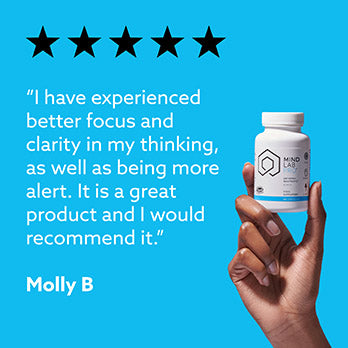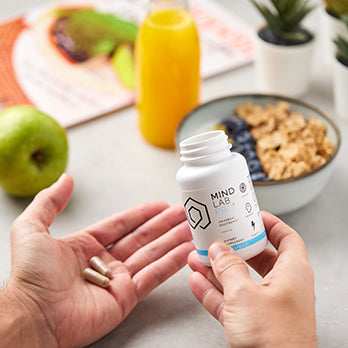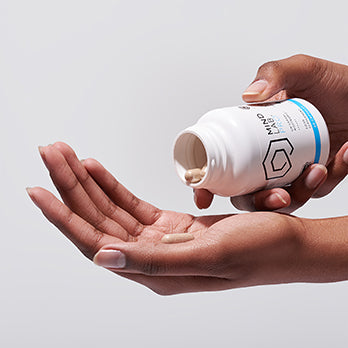However you approach it, drug addiction is tough to beat. More than simply a fixation, it is a chronic illness that can consume you both mentally and physically, and it will only worsen over time if left unaddressed. But what makes drugs so addicting? And what's the best way to overcome their hold on your mind and body?
This guide details the science behind addiction and how nootropics for drug addiction can make quitting the habit a whole lot easier.
Why Are Drugs So Addicting?
The phrase "there's no such thing as a free lunch" applies to drug use just as much as anything else. Sure, drugs can give you a temporary "high," but only at the cost of long-term harm. In other words, you're paying a lot more than cash every time you use drugs, and the damage your body takes is proof of that.
What's more, drugs are fundamentally designed to be addictive. Even using one just once could cause your body to crave the drug despite the harm it causes.
Why does this happen? Well, the body is naturally wired to want to repeat actions that make it feel good. Taking drugs provides a greater surge in good feelings than most other activities do, and the body tends to prioritize these good feelings even above pain and injury. To prove the point, the recent National Survey on Drug Use and Health reported that more than 7 million people in the U.S. battle drug abuse each year, and the World Health Organization estimates its global burden to be 5.4% worldwide.
In the U.S. alone, the issue has resulted in financial costs approaching $200 billion in healthcare, criminal justice, legal, and lost workplace production, according to the Office on National Drug Control Policy. Yet relapse continues to be exceedingly common due to the addictive power of drugs; the National Institute on Drug Abuse has found that relapse rates after quitting may be as high as 60%.
Fortunately, these national institutes and societies also state that addiction is absolutely manageable — especially with the assistance of medication, behavioral therapy, and, of course, the top nootropics for drug addiction.
The Drug Addiction Pathway
The National Institutes of Health defines drug addiction as a "chronic disease" characterized by compulsive drug use that is difficult to control. Many people mistakenly believe that drug addicts just lack the willpower or moral fortitude to stop using, but the reality of the matter is that drug addiction is a sickness — one that begins in the brain.
- “A common misperception is that addiction is a choice or moral problem, and all you have to do is stop. But nothing could be further from the truth,” Dr. George Koob, director of the National Institute on Alcohol Abuse and Alcoholism, said in a statement. “The brain actually changes with addiction, and it takes a good deal of work to get it back to its normal state. The more drugs or alcohol you’ve taken, the more disruptive it is to the brain.”
Drugs can literally alter the way the brain works and interfere with a person's basic ability to resist the urge to use them.
From the outsider's perspective, the most tangible signs of drug addiction are changes to behavior and physical appearance, but behind every shift in attitude and conduct is a fundamental alteration in brain physiology.
Addiction Changes the Brain
Drugs are capable of hijacking key regions in the brain. By taking over — or in some cases destroying — these areas, addiction converts what were once helpful brain processes into dangerous ones. For example, they can alter the pleasure-reward circuit in your brain to make you think that you need more of a drug, even if the drug is harming your body. <1>
Addiction can also hyper-activate your danger-sensing circuits, tricking your body into feeling stressed or depressed when you’re not using a drug.
Furthermore, medical brain imaging has revealed that extended drug use can damage the prefrontal cortex, which is the primary decision-making center of the brain. When this occurs, people often become unable to stop taking a drug even when they know that it will result in serious consequences.
Addiction Abuses Neurotransmitters
The body is home to several core neurotransmitters in charge of managing euphoria, or making the body feel good. The brain releases a flow of these neurotransmitters in response to certain actions, memories, or sensations. Drugs, on the other hand, trigger the release of a massive wave of neurotransmitters from the brain the moment they enter a person's body.
Drugs take over the pleasure-reward pathway and, for the most part, focus on releasing huge amounts of the following neurotransmitters:
- Dopamine is the primary neurotransmitter in charge of the body’s pleasure-reward system.
- Serotonin plays an essential role in regulating mood, pain, sleep, appetite, among other behaviors.
- Norepinephrine is vital in the brain's ability to regulate cognition, motivation, and intellect, as well as energy levels.
The sudden increase in the availability of these neurotransmitters is responsible for the "high" that people associate with drug use. However, releasing them in excessive quantities drains their supply and results in negative aftereffects. In many cases, drugs can lead to dependance by making it more difficult for the brain to release these neurotransmitters on its own.
Consequences of Drug Addiction
Physical Effects
Drugs can start affecting the body as soon as they are consumed. Once the initial high is gone, drugs can lead to short-term side effects ranging from minor changes in appetite, blood pressure, heart rate, mood, and sleep patterns, to problems with coordination and breathing.
On the long term, drug use can increases the risk of serious health complications and potentially result in a fatal condition.
Emotional Effects
Long-term drug use can lead to changes in other physiological pathways as well, affecting functions that include but are not limited to:
- Learning
- Memory
- Mood
- Self-control
- Self-awareness
- Decision-making and judgment
- Relationships with others
In addition, physiological changes are typically followed by mood swings (from depression to ecstasy), loss of motivation, anxiety, fatigue, and stress.
Drug use is particularly risky for adolescents, according to the EEG and Clinical Neuroscience Society. Abusing drugs before the brain is fully developed greatly increases its influence on the brain and the likelihood of addiction later on in life.
How Nootropics Can Fight Addiction
There are numerous strategies to fighting drug addiction, from chemical replacement therapy to behavioral counseling. Many of these options, however, rely on temporary solutions that can draw individuals away from drugs but only by making people become dependent on a different— albeit less dangerous — substance. In other cases, people have tried to overcome addiction by going "cold turkey" and stopping drug use all together, but this path runs the risk of damaging the body.
Able to bolster all of these different methods for quitting, nootropics are equipped to combat addiction at its core. As natural products, they are not only safe and non-addictive but appropriate for long-term use as well.
Supplying Neurotransmitters
Similar to nootropics for quitting smoking, some nootropics can help combat addiction by supplying the body with a healthy dose of dopamine and serotonin. In effect, these nootropics can serve as a much milder substitute for drugs, without the major adverse side effects.
Various medical institutions have actually begun promoting the use of nootropics as natural replacements for prescription and medicinal drugs. In one such case, researchers from the University of Munster in Germany discovered that the nootropic Maritime Pine Bark Extract was as effective as its standard drug counterpart but without the drug's inherently addictive quality.
Managing Withdrawal
One of the most effective ways to use nootropics for drug addiction may be to help manage withdrawal. Numerous studies have affirmed that nootropics promote a variety of benefits related to overcoming symptoms of withdrawal, including the following:
- Calming the body
- Reducing stress and anxiety
- Reducing shaking and sweats
- Improving mood
- Increasing concentration
- Restoring motivation
- Curbing the effects of "hangover" symptoms
Fighting Relapse
A major challenge with fighting drug addiction is that the battle never seems to end. Even after people are finally able to quit, their body continues to long for the drug.
Fortunately, nootropics can help with this aspect of quitting too; nootropics have demonstrated a capacity to decrease drug cravings throughout the quitting process and for a long time afterwards. Supplementing with nootropics can thus play a critical role in reducing drug dependency well beyond the early stages.

Mind Lab Pro® Nootropics for Drug Addiction
Research backing the application of nootropics for drug addiction is still in its early stages. The vast majority of support for nootropics is based on animal studies. However, a few clinical trials have found the intake of certain nootropics (above all, citicoline) to be effective at countering addiction and facilitating quitting.
Citicoline
Citicoline is best known as a cognition- and memory-enhancing brain energizer, but its biochemical actions within the body also make it a likely candidate for combating drug addiction.
Its primary function is as a precursor of the compound acetylcholine, which ultimately gives it a pivotal role in neuronal signaling. In essence, supplementing with the nootropic increases levels of key neurotransmitters that are often depleted by drug use.
Citicoline can increase the presence of norepinephrine, dopamine, and serotonin in the hypothalamus and other regions of the brain responsible for managing the endocrine system and, in turn, regulating hormones. Thus, citicoline has the potential to serve as a natural replacement for many addictive substances.
Nearly a dozen clinical trials have corroborated this idea in recent years. A comprehensive review of these studies concluded that citicoline was not only safe to use and well-tolerated but effective against addiction as well: <2>
-
"Citicoline appears to decrease craving and is associated with a reduction in
use."
Collectively, the nootropic demonstrated promising benefits for former drug users, including the following:
- Decreasing cravings
- Improving concentration and orientation
- Prolonging treatment retention
- Restoring brain response to food stimuli
- Reducing depression and other mood-related symptoms
Of note, researchers from one of the clinical studies reported that citicoline intake reduced the rate of drug relapse by more than 6 times that of the placebo.
More on Mind Lab Pro® Citicoline
Rhodiola Rosea
As an herbal adaptogen, Rhodiola rosea may fortify the mind and body against a wide variety of stressors, as well as optimize physical and mental activity. In terms of addiction, Rhodiola promotes several bioactivities that may help ease the withdrawal process:
- Modulating stress hormones
- Balancing the release of norepinephrine, dopamine, and serotonin
- Sustaining acetylcholine levels
- Protecting brain cells
Multiple rodent-based studies have shed light on the adaptogen's potential as an aid for quitting a plethora of drugs.
- Short- and long-term Rhodiola administration significantly reduced both the development and expression of drug dependency <3>
One study suggested that the supplement could be great for managing withdrawal as well: Rhodiola "abolished" common withdrawal symptoms such as shaking, tremors, and chewing. <4> In addition, researchers of a separate study discovered that Rhodiola was "effective for reducing craving and vulnerability to relapse." <5>
More on Mind Lab Pro® Rhodiola Rosea
L-Theanine
The amino acid L-Theanine made its name long ago as one of the main soothing ingredients found in green tea. Research has verified its capacity to increase the activity of alpha brain waves, which are associated with "wakeful relaxation," enhanced mood, and mental clarity.
L-Theanine is also known to naturally increase levels of serotonin, dopamine, and GABA, reducing the body's dependance on drugs to maintain sufficient levels of these neurotransmitters. It has also demonstrated an ability to protect brain cells by blocking glutamate receptors and promoting antioxidation.
Collectively, these bioactivities may prove useful for overcoming drug addiction. Among its most relevant potential effects include the following:
- Promoting calm without sedation
- Increasing attention and alertness for mental tasks
- Managing jitteriness
- Instilling a sense of relaxation and even happiness
Various animal studies have further corroborated some of these effects, showing that the nootropic was particularly well-geared toward dealing with withdrawal. L-Theanine can significantly attenuate withdrawal signs ranging from anxiety to irritability.
- One scientific study showed that L-Theanine attenuated a variety of drug withdrawal signs such as rigid abdominal muscles, abdominal pain, retching, shaking, and pacing. <6>
- "The results of these studies suggest that L-Theanine may be useful in the pharmacotherapy of treating
withdrawal as well as anxiety-associated behaviors," the researchers concluded.
In addition, L-Theanine appeared to have a relatively quick onset of action in these studies, with a duration of at least 2.5 hours.
More on Mind Lab Pro® L-Theanine
Bacopa Monnieri
Like Rhodiola, Bacopa Monnieri is a stackable adaptogen that has a rich history of use in herbal medicine. The Ayurvedic herb contains a substantial amount of active bacosides that may improve aspects of memory and learning.
Regarding drug addiction, Bacopa's adaptogenic activity can help the body cope with its stress responses during periods of non-drug use and withdrawal. Bacopa's ability to promote the natural production of acetylcholine, serotonin, and GABA may also lessen the body's drug cravings and dependance.
Several animal studies have affirmed various potential beneficial effects from taking Bacopa for the management of drug addiction:
- Decreasing drug withdrawal-based depression <7>
- Reducing the development and expression of drug tolerance <8>
- Lowering drug-induced hyperactivity <9>
- Protecting brain cells against toxicity from extended drug use <10>
- Protecting the liver and kidney against toxicity from extended drug use <11>
In a similar fashion, several other nootropics may help deal with these symptoms as well: lions mane could help reduce anxiety and depression and N-Acetyl L-Tyrosine could help ward off stress.
More on Mind Lab Pro® Bacopa Monnieri
Conclusion
Mind Lab Pro® offers a combined formulation of nootropics for drug addiction that provide a natural alternative to drug-quitting therapies.
Drug addiction has negative effects on the mind and body of a person that only intensify with continued use. Stopping the cycle is extremely difficult and often requires a lot of emotional and medical support. There are numerous types of therapies to overcoming drug addiction, and it takes time to figure out which one is best for a particular individual.
Whatever method a person decides to take, a strategy of stacking nootropic supplements can help by reducing drug cravings and dependance as well as by managing withdrawal symptoms, from depression and anxiety to shaking and pain.
Mind Lab Pro® provides a comprehensive group of nootropics designed to help make the process of quitting as safe and painless as possible.
References
- Adinoff B. Neurobiologic Processes in Drug Reward and Addiction. Harvard Review of Psychiatry. 2004; 12(6): 305-20.
- Wignall ND, et al. Citicoline in addictive disorders: a review of the literature. American Journal of Drug and Alcohol Abuse. 2014 Jul; 40(4): 262-8.
- Mattioli L, et al. Effects of a Rhodiola rosea L. extract on acquisition and expression of morphine tolerance and dependence in mice. Journal of Psychopharmacology. 2011 Mar; 25(3): 411-20.
- Mattioli L, et al. Evaluation of Rhodiola rosea L. extract on affective and physical signs of nicotine withdrawal in mice. Journal of Psychopharmacology. 2011 Mar; 25(3): 402-10.
- Mattioli L, et al. Effects of a Rhodiola rosea L. extract on the acquisition, expression, extinction, and reinstatement of morphine-induced conditioned place preference in mice. Psychopharmacology (Berlin). 2012 May; 221(2): 183-93.
- Wise LE, et al. L-theanine attenuates abstinence signs in morphine-dependent rhesus monkeys and elicits anxiolytic-like activity in mice. Pharmacology Biochemistry and Behavior. 2012 Dec; 103(2): 245-252.
- Rauf K, et al. Inhibitory effect of bacopasides on spontaneous morphine withdrawal induced depression in mice. Phytother Res. 2014 Jun; 28(6): 937-9.
- Rauf K, et al. Effect of Bacopasides on acquisition and expression of morphine tolerance. Phytomedicine. 2011 Jul 15; 18(10): 836-42.
- Rauf K, et al. A Bacoside containing Bacopa monnieri extract reduces both morphine hyperactivity plus the elevated striatal dopamine and serotonin turnover. Phytother Res. 2012 May; 26(5): 758-63.
- Shahid M, et al. Neuroprotective effect of Bacopa monnieri against morphine-induced histopathological changes in the cerebellum of rats. Pakistain Journal of Pharmaceutical Sciences. 2017 Nov; 30(6): 2067-2074.
- Shahid M, et al. Beneficial effects of Bacopa monnieri extract on opioid induced toxicity. Heliyon. 2016 Feb; 2(2): e00068.



































